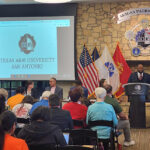Over the past couple of months, Faculty Senate has made a series of proposals that include an external budget audit and changes in the administrative evaluation process.
The key items in recent conversation are:
Calls for support for tenure and academic freedom goes unanswered
A Feb. 25 meeting composed of 15 faculty members on Feb. 25 served to address faculty concerns over statements made by Lt. Gov. Dan Patrick on Feb. 18.
Patrick made a public proposal to end university tenure in an effort to halt the teaching of critical race theory, which would put most full-time professors at risk of losing the financial benefits guaranteed by tenure.
In direct response to this proposal, University President Cynthia Teniente-Matson forwarded a statement to faculty members on March 3 indicating that administration will follow guidance from “state leaders” in regards to tenure.
In a March 4 resolution by Dr. Katherine Bridgeman, members of the senate composed two statements in support of tenure and academic freedom, specifically the freedom to teach “issues of race, sexuality and social justice.”
These resolutions called upon administration to issue a “public and assertive defense of academic freedom.”
When pressed about the resolution at the April 1 senate meeting, Matson clarified the statement released on March 3 was their official word on tenure.
“I have provided my support in my statement and I am talking with elected officials about the issues as they arise,” Matson said. “We are following system protocols on this matter as we move forward.”
As of publishing, interim provost Dr. Mark Weichold and Matson have declined to make further comments on the resolution.
Calls for external university budget audit
Following news of a $4 million budget shortfall in November, assistant professor of English Katherine Bridgeman presented a resolution on March 4 for an audit of the university’s budget.
Co-sponsored by previous senate presidents, the resolution calls for an “independent external audit of the university’s budget followed by a special session.”
Bridgeman said this special senate session would be “open to all faculty.”
The resolution was created because of faculty concerns about the budget deficit and to seek greater transparency from administration.
While administration has previously offered “summarised responses” to faculty members regarding the budget shortfall, this resolution aims to gather specific details, including what factors led to the shortfall.
Gilbert Barrera, clinical assistant professor in the department of accounting and finance, pointed out the Texas A&M system conducts an annual audit of its universities. Any external audit is “prohibited.”
Faculty Senate president Joseph Simpson confirmed Matson would be unable to grant authorization for an external audit and suggested requesting internal auditors follow the current resolution to achieve the same results.
Matson suggested tabling the resolution and instead committing to a “budget debrief” which would yield more details than an annual audit.
James Finley, associate professor college of arts and sciences, reiterated faculty’s concerns with administration’s transparency as well as with the numbers.
“I think if we can refocus on some of the issues which are faculty trust, accountability and transparency — I think that would go a long way toward meeting some of the goals of people who brought this (up),” Finley said.
While conversations about the legality of the external audit were up for conversation, Finley reiterated faculty were hoping to learn what factors caused the $4 million budget deficit in the first place — information that hasn’t been made publicly available yet.
Bridgeman suggested amending the title of the resolution to account for this discussion.
New rules proposed to allow faculty participation in screening academic administrators
Eleven ad hoc committee members drafted new rules that would allow faculty members to participate in the evaluation and retention of academic administrators.
One of the committee members, biology program coordinator Megan Wise de Valdez, presented these proposed rules on April 1.
“We found that there is no formal process in A&M-San Antonio system policy for the evaluation of administrators by anybody,” Wise said.
Wise said the committee looked at administration screening policies used by other universities, such as Texas A&M at College Station, as reference.
Some positions that would potentially undergo this screening process would be provosts, deans, department heads and department chairs.
After discussion, it was decided these rules may be amended in the future to possibly include other administrative positions, as well.
The two documents presented a thorough plan for evaluation procedures as well as survey drafts.
These proposed rules are part of a larger effort to progress “shared governance” between faculty and administration.






